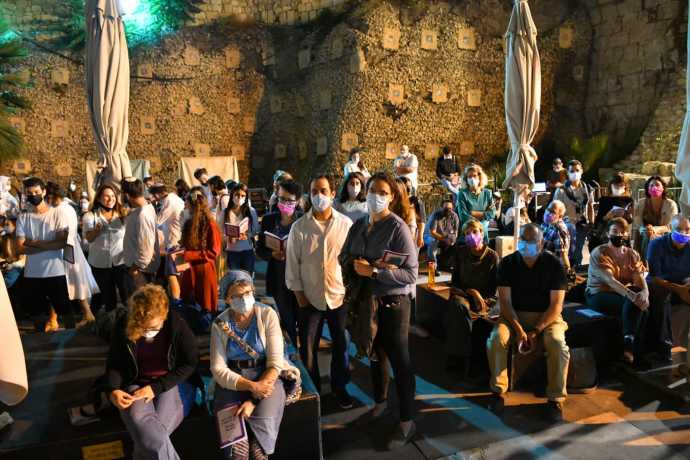It sounds like the start of a corny Jewish joke, “This past Shabbat, I hosted an Orthodox, Conservative and Reform rabbi...”
It wasn’t a joke, we hosted a beautiful Shabbat with a diverse crowd, including two young women who are lone bnot sherut, Americans volunteering for a year in Israel’s national service. One might think that rabbis from all three branches of Judaism getting together doesn’t happen that often and would be remarkable, but in the past few years these gatherings are happening frequently.
The “three branches of Judaism” as Orthodox, Conservative and Reform are often called, have a contentious history. There has been great animosity between the three movements. Orthodox Judaism rejects the validity of both Conservative and Reform Judaism. Orthodox Judaism will work with Conservative and Reform Judaism on issues of Jewish survival but not on issues of Jewish law or tradition.
Conservative Judaism accepts Orthodox Judaism’s standing on Jewish law and tradition, but criticizes its strict adherence to traditional authority and refusal to be more liberal to new interpretations of Jewish law.
Conservative Jewry also rejects Reform Judaism’s too-liberal approach to Jewish law but will work alongside Reform and Orthodox rabbis in many areas. Reform Judaism maintains Orthodox and Conservative Judaism are too loyal to tradition and has a history of divisiveness in its relationship between the other movements.

These issues might seem superficial at face value, especially when summarized in one paragraph, but the differences between the movements, especially between the leaders and scholars of each movement, are crucial to Judaism. The Jewish people and Judaism are not one and the same. The Jewish people is a living and vibrant body, always adapting to new circumstances and finding a way to thrive.
Judaism, on the other hand, is a traditional system with axioms.
System of Judaism
The Jewish people isn’t a source of dispute among the three movements, but the system of Judaism is the point of contention. The degree of liberty that can be taken with the system is debated among the three movements. Each movement maintains the amount of liberty that can be taken within the traditional system is essential to Judaism.
The serious nature of these disagreements has led to decades of discord between the movements.
For years Orthodox rabbis maintained that working with Conservative and Reform rabbis lends legitimacy to their movements and views of Judaism. Conservative and Reform rabbis refused to deal with Orthodox rabbis and each other in power struggles over who was able to lead the Jewish people into its future.
In the year 5782 (2022), it could be assumed that these disagreements would be exacerbated and worse than even just a few years ago. The controversy over prayer space at the Western Wall has flared up frequently and causes divisions among the different movements. This issue, along with others like conversion, kashrut supervision and civil marriages, makes any cooperation and congeniality between the movements surprising.
The leaders of all three movements have recognized the issues that unite all three movements are far greater than the issues that divide the movements. The competition, contention and even philosophical differences between the movements take a second seat to the survival of the Jewish people.
Each Jew can decide for themselves where they want to focus. Jews can decide to focus on the issues that divide or unite world Jewry. The three weeks of mourning over the destruction of the temples is less about mourning and more about repentance. Although to the unlearned eye, Judaism might seem like a religion that focuses on the past, it only looks to the past to instruct the present and future.
We don’t mourn and fast over past events, but rather to inspire repentance over the sins that brought about the destruction of the temples and that our generation repeats today.
One of the sins that brought about the destruction of the Second Temple was baseless hatred. If Jews insist on focusing on the divisions of our people, exasperating the fissures of our nation, we’re missing the objective of these three weeks and can expect the contentious situation among our people to get worse.
At the Shabbat table
At our Shabbat table we focused on one question throughout the meals. We asked each person if they were to write one chapter of a book on the topic they felt was most important for the Jewish people to hear about, what topic would they choose? As we went around the table throughout the meals, various answers were offered, but one idea kept resurfacing.
Participants at the meals stressed the value of listening to diverse opinions, especially those that differ from your own. With a diverse group of people with strongly differing opinions, it was gratifying to hear people advocating for respectful discourse among all Jewish people.
One of the most fascinating aspects of this unique Shabbat was its location. Mitzpe Yeriho is a small town 10 km. northeast of Jerusalem. To most of the world it is known as an illegal settlement in the occupied West Bank; to its residents, it is known as a Jewish town in Judea and Samaria.
The mere mention of such a town in “mixed company” can generate contentious disagreement. Yet of all places, a Jewish settlement hosted a peaceful discussion between divergent movements within Judaism.
Over the next three weeks, the Jewish people will pray and hope for the building of the Third Temple and the start of the Messianic era. That can only happen if the Jewish people comes together and unites.
Jewish unity isn’t a miraculous phenomenon, it comes about through respecting each Jew, especially Jews with whom we disagree on crucial issues. We don’t have to agree or even legitimize opinions we feel are wrong or dangerous for the Jewish people, but we must listen courteously and respond with respect.
The writer is a senior educator at numerous educational institutions. He is the author of three books and teaches Torah, Zionism and Israel studies around the world.
